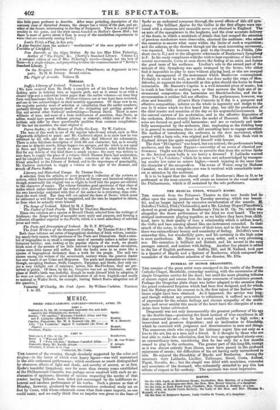MUSIC.
THIRD PHILHARMONIC CONCERT—MONDAY, APRIL 20.
PART I.
Sintbnia in D, Op. 49, (composed expressly for, and dedi-
cated to the Philharmonic Society) Spahr. Duetto, " caprice]," Madame Caradori Allan and Sig-
nor F. Lablache (Matilda di Shabran) Rossini.
Caprice, Pianoforte, Mr. W. S. Bennett (Op. 22) W. S. Bennett.
Aria, "La Vendetta," Signor F. Lablache (Le None di
Figaro) Mozart. Overture, Fiddle Beethoven.
PART II.
Sinfonia in F (No. 8) Op. 93 Beethoven. Recit 1 " Was sag lob." } C. M. von Weber.
Aria, I Fern von thin, " Madame Caradort Allan.. • •
Concerto, Harp, Mr. Parish Mvars P. Alvars.
Overture, L'Aleade de to Vega Onslow.
Conductor, Mr. Costa.
THE interest of the evening, though slenderly supported by the solos and singing—in the latter of which were heavy lapses—was well maintained in the able orchestral performance; which continues as much distinguished by clearness, effects of light and shade, and novelty of accent, as at first. Spohr's beautiful Symphony, now for more than twenty years established at the Philharmonic Concerts, was perhaps never received with such an ac- clamation of applause; diversity of opinion respecting the merits of that master having hitherto been aided and encouraged by the indifferent re- hearsal and careless performance of his works. Such a picture as that of Monday, however, produced by the conscientious orchestral study set on foot by Costa, with whom rehearsals mean what their name imports, no one could resist; and we really think that an impulse was given to the fame of Spohr as an orchestral composer through the novel effects of this old syml phony. The brilliant figures for the violins in the first allegro were exe- cuted with a clearness and ensemble never yet obtained in England. The • awents of the appogiatnre in the larghetto and the clear accurate delivery of the finale, in which a multitude of details that had escaped the attention- of previous conductors were observable, charmed the audience; who seized, the occasion to encore what came within the limits of such a requisition; and the scherzo, as the shortest though not the most interesting movement, was repeated. Like honours were paid to the Overture to Fiddle, (the short one in E,) and to the allegretto scherzando of Beethoven's Symphony in F. In his ready compliance with the wish to hear repetitions of fine instru- mental movements, Costa at once shows the feeling of an artist and fosters the good taste of his audience. Lindley's solo in the second part of the minuet of this Symphony was again swamped by the horns; who either find it impossible to play in tune without playing loud, or else are unequal to that management of the instrument which Beethoven contemplated. Probably it would be well, as we think was done under the reign of Men- delssohn, to augment the violoncelli at this point should the horns be found intractable. Mr. Bennett's Caprice is a well-intended piece of music • but in truth it has little or nothing new, or that answers the high aim of in- strumental composition: the harmonies are Mendelssohnian, and the in- strumentation is neither full nor effective. The performance, however, was clear and beautiful. Alvars's Harp Concerto in E flat is a pompous and effective composition- inferior on the whole in ingenuity and design to the one in G minor which we first heard him play, but still the production of the chief master and musician of the day on his ungrateful instrument. In the natural current of his modulation, and in the effective disposition of the orchestra, Alvan closely follows the model of Hummel. His brilliant solos are formed on good solid harmonies; and are so variously and taste- fully accompanied by the orchestra, that, unpleasing SS the tinkling harp is in general to musicians, there is still something here to engage attention. His method of introducing the orchestra in the slow movement, which opened with a harp solo, was original and beautiful. In this fresh visit to England Alvars has again acquitted himself with honour.
The duet "Di Capricei "was heard, but not noticed; the performance being mediocre, and the music flippant—unworthy of an arena of classical per- formance. Ought not the Directors to perceive that from the serious Spohr to the farcical opera buffs is too heavy a descent? F. Lablache wanted power in "La Vendetta;" which he in some sort acknowledged by transpos- ing sundry low notes an octave higher,—much injuring at the same time the character of the composition. The scene. of Weber, sung by Madame Caradori, we did not recognize; nor was it received with remarkable inter- est or attention by the audience.
It is to be hoped that the choral effect of Beethoven's Mass in D, to be performed at the next concert, will create an interest in the vocal music of the Philharmonic, which is ill sustained by the solo performers.


























 Previous page
Previous page